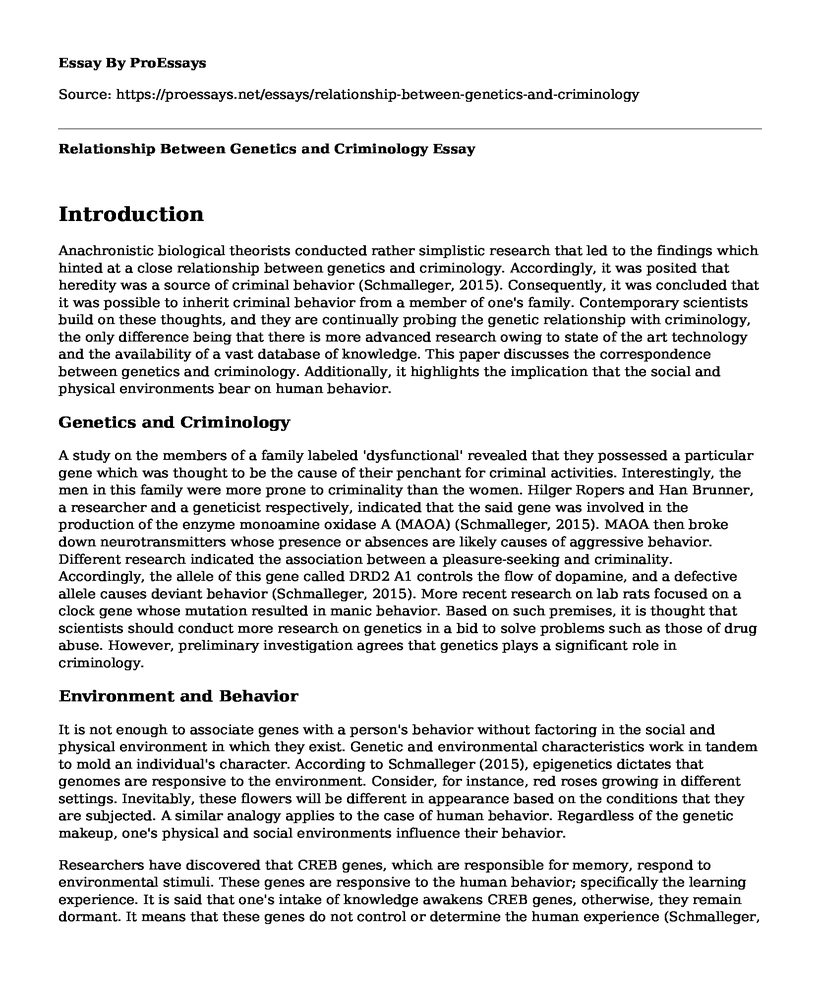Introduction
Anachronistic biological theorists conducted rather simplistic research that led to the findings which hinted at a close relationship between genetics and criminology. Accordingly, it was posited that heredity was a source of criminal behavior (Schmalleger, 2015). Consequently, it was concluded that it was possible to inherit criminal behavior from a member of one's family. Contemporary scientists build on these thoughts, and they are continually probing the genetic relationship with criminology, the only difference being that there is more advanced research owing to state of the art technology and the availability of a vast database of knowledge. This paper discusses the correspondence between genetics and criminology. Additionally, it highlights the implication that the social and physical environments bear on human behavior.
Genetics and Criminology
A study on the members of a family labeled 'dysfunctional' revealed that they possessed a particular gene which was thought to be the cause of their penchant for criminal activities. Interestingly, the men in this family were more prone to criminality than the women. Hilger Ropers and Han Brunner, a researcher and a geneticist respectively, indicated that the said gene was involved in the production of the enzyme monoamine oxidase A (MAOA) (Schmalleger, 2015). MAOA then broke down neurotransmitters whose presence or absences are likely causes of aggressive behavior. Different research indicated the association between a pleasure-seeking and criminality. Accordingly, the allele of this gene called DRD2 A1 controls the flow of dopamine, and a defective allele causes deviant behavior (Schmalleger, 2015). More recent research on lab rats focused on a clock gene whose mutation resulted in manic behavior. Based on such premises, it is thought that scientists should conduct more research on genetics in a bid to solve problems such as those of drug abuse. However, preliminary investigation agrees that genetics plays a significant role in criminology.
Environment and Behavior
It is not enough to associate genes with a person's behavior without factoring in the social and physical environment in which they exist. Genetic and environmental characteristics work in tandem to mold an individual's character. According to Schmalleger (2015), epigenetics dictates that genomes are responsive to the environment. Consider, for instance, red roses growing in different settings. Inevitably, these flowers will be different in appearance based on the conditions that they are subjected. A similar analogy applies to the case of human behavior. Regardless of the genetic makeup, one's physical and social environments influence their behavior.
Researchers have discovered that CREB genes, which are responsible for memory, respond to environmental stimuli. These genes are responsive to the human behavior; specifically the learning experience. It is said that one's intake of knowledge awakens CREB genes, otherwise, they remain dormant. It means that these genes do not control or determine the human experience (Schmalleger, 2015). This finding supports the stance that genetics alone cannot determine human behavior.
Conclusion
All in all, early and contemporary scientists agree that genetics is closely associated with criminology. Individuals that hail from families that are known to have some criminal record are likely to engage in illegal activities. The gene MAOA has been discovered to be contributory on this front. However, environmental factors are equally expected to influence human behavior. In fact, ecological factors dictate genomic responses. It means that genetics is the necessary but not the sufficient determinant for human behavior. Consequently, it is essential to conduct further research that will incorporate both these elements to arrive at a sweeping conclusion.
References
Schmalleger, F. (2015). Criminology today: An integrative introduction (7th ed.). New York, NY: Pearson.
Cite this page
Relationship Between Genetics and Criminology. (2022, Feb 17). Retrieved from https://proessays.net/essays/relationship-between-genetics-and-criminology
If you are the original author of this essay and no longer wish to have it published on the ProEssays website, please click below to request its removal:
- The Obama Care Act and Constitution Case Study
- Sacco and Vanzetti Case Study
- Philosophical and Practical Approach for Balancing Issues in Criminal Justice - Essay Sample
- Criminal Behaviors: Isolation in the Community as Punishment - Essay Sample
- EU Social Charter: Ensuring Human Rights Protection for All - Essay Sample
- Essay on Officer Taylor's Prejudiced Decision-Making: A Closer Look
- Paper Example on Pennsylvania Law: Consumer Health Info Privacy & Protection







